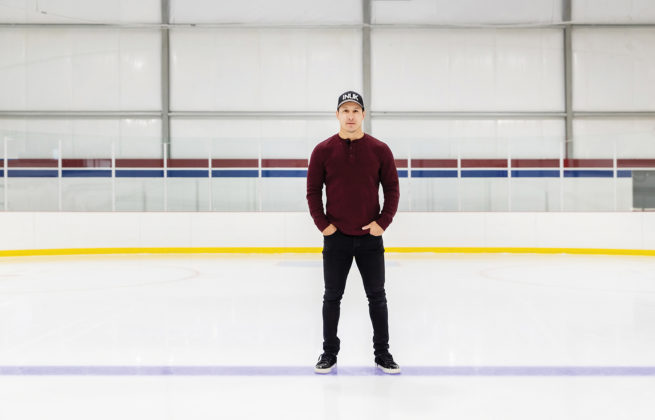June 1, 2019
This former NHLer charts a new path as a philanthropist
Jordin Tootoo grew up in Rankin Inlet, Nunavut, a small northern Canadian Inuit community and former mining town where hockey reigns supreme. Like many kids, he was barely walking when he began skating at his local rink, the Singituk Complex. Unlike many kids, he and his siblings had access to unlimited ice time.
“My father was a hockey player himself and back when we were kids, he ran the arena,” says Tootoo, this year’s guest speaker at Edmonton Community Foundation’s (ECF) annual meeting. “We had access to the rink pretty much any time we wanted.”
All that ice time, combined with the fun of playing with local kids, made Jordin fall in love with hockey — and the camaraderie that comes with it. “You automatically become buddies in that dressing room,” he says. From the beginning, he loved how hockey helped him get to know people from different walks of life. “It doesn’t matter what race you are,” he says, “hockey welcomes everyone.”

Starting out on local teams, Jordin soon graduated to the Opaskwayak Cree Nation (OCN) Blizzard, a Junior A team based in Opaskwayak/The Pas, Manitoba. In 1999, he joined the Wheat Kings, a Western Hockey League team in Brandon, Manitoba, in the hopes of making it to the NHL. Just one year later, he got his wish when he was drafted by the Nashville Predators. In 2003, Tootoo played his first league game, becoming the first Inuk player in the NHL.
But at the same time Jordin was making his dreams come true, his older brother, Terence Tootoo, was losing a battle with depression. Just one year after Jordin was drafted, he lost his brother to suicide. In the note he left behind, Terence urged him to ‘Go all the way,’ but for a time it seemed Jordin’s career would be cut short by alcoholism, as he struggled to cope with the loss.
After eight years in the league and many years drinking heavily, Jordin checked himself into rehab to work toward sobriety and to face his grief head-on. Sober and healing, he returned to professional hockey with a new lease on life, retiring last year after 15 years (the average NHL career is just five). As he continued his healing journey, Jordin became increasingly more comfortable talking about his emotions, something he had always struggled with. “I grew up in a household where we were taught that no man shows emotion or weakness,” he says. “We didn’t sit down and have conversations about life in general, how we were feeling or what was going on.”
The Tootoo family wasn’t unusual in this respect, says Jordin. Many Canadian families aren’t talking about mental health, and suicide and self-harm are the leading causes of death in Indigenous people under the age of 44. Wanting to do something about that, Jordin started the Team Tootoo Fund in 2011 to help raise awareness about suicide and bolster existing charities helping at-risk kids, especially Indigenous youth. Now, Jordin tells his story again and again at the many communities he visits and fundraisers he attends. He also shared his journey in his 2014 memoir, All The Way: My Life on Ice.
Life after hockey can be hectic, but Jordin says his busy schedule is worth it when he sees the youth he meets “making a turn for the best” — like the unnamed up-and-coming Indigenous hockey player who was on the verge of giving up on his dreams.
“Last year, I spoke to him and convinced him to stick with it,” says Jordin. He played his first NHL game in March of this year.